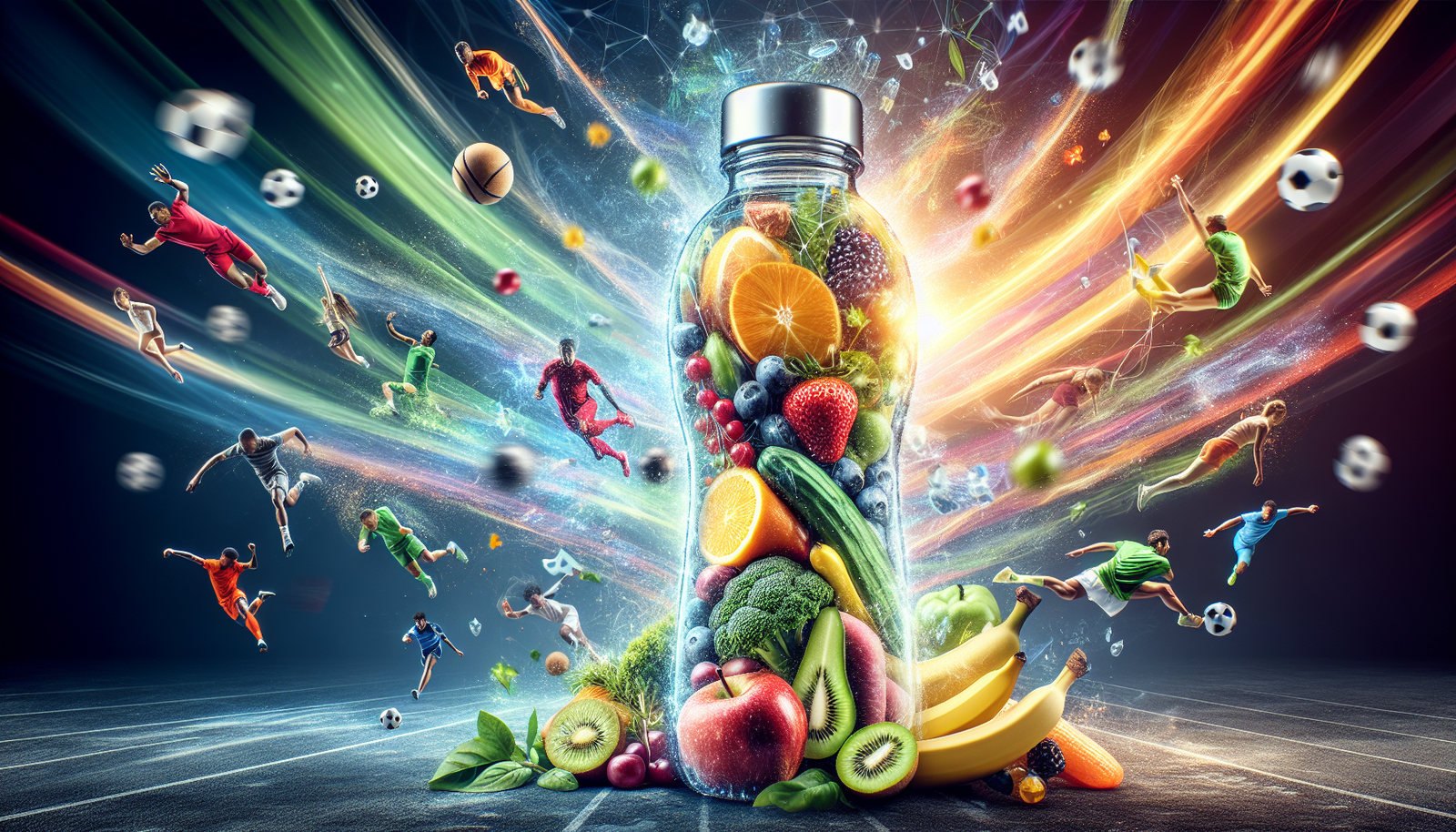In the world of sports nutrition, the spotlight often falls on macronutrients like carbohydrates, proteins, and fats. However, there’s another vital component that deserves our attention: micronutrients. These little powerhouses, including vitamins and minerals, play a crucial role in optimizing athletic performance and supporting overall health. From boosting energy production to enhancing recovery and immune function, micronutrients are the unsung heroes that keep athletes at the top of their game. So, let’s dive into the fascinating world of micronutrients and unravel their indispensable role in sports nutrition.
Micronutrients in Sports Nutrition
Micronutrients play a crucial role in sports nutrition, providing essential vitamins and minerals that are vital for optimal performance and overall health. Athletes have unique nutritional needs due to the demands they place on their bodies during training and competition. Therefore, understanding the importance of micronutrients and ensuring they are properly incorporated into an athlete’s diet is essential for maximizing their performance potential.
Vitamins
Vitamins are organic compounds that are essential for various bodily functions. In sports nutrition, certain vitamins are of particular importance due to their role in energy production, muscle function, and recovery. Examples of these essential vitamins include:
Essential Vitamins for Athletes
-
Vitamin C: This vitamin is known for its antioxidant properties, which can help reduce exercise-induced oxidative stress. It also plays a critical role in collagen synthesis, aiding in the repair and maintenance of connective tissues, such as tendons and ligaments.
-
Vitamin D: Adequate vitamin D levels are essential for bone health and muscle function. It helps promote calcium absorption, which is crucial for maintaining strong bones and preventing stress fractures.
-
B-complex vitamins: These include thiamine (B1), riboflavin (B2), niacin (B3), pantothenic acid (B5), pyridoxine (B6), biotin (B7), folate (B9), and cobalamin (B12). B-complex vitamins are involved in energy metabolism, playing a crucial role in converting carbohydrates, fats, and proteins into usable energy.
Benefits of Vitamins in Sports Nutrition
Incorporating adequate amounts of vitamins into an athlete’s diet can offer several benefits. First and foremost, vitamins support optimal energy production by participating in enzymatic reactions involved in fuel metabolism. This ensures that the body efficiently utilizes carbohydrates, fats, and proteins for energy, which is crucial for sustaining high levels of performance.
Furthermore, vitamins contribute to the proper functioning of the immune system, helping athletes stay healthy while undergoing intense training regimens. Regular exercise can temporarily suppress the immune system, making athletes more susceptible to illness. By including vitamins in their diet, athletes can support immune function and minimize the risk of illness and infection.
Sources of Vitamins
It is always best to obtain vitamins from whole food sources rather than relying solely on supplements. Fresh fruits and vegetables, lean meats, dairy products, and whole grains are excellent sources of vitamins. Including a wide variety of these nutrient-dense foods in an athlete’s diet can help ensure they receive an adequate intake of the essential vitamins they need.
Minerals
Like vitamins, minerals are essential micronutrients that athletes require to support their overall health and performance. Minerals are inorganic substances needed for various physiological processes in the body, including muscle contraction, oxygen transport, and enzyme activation.
Essential Minerals for Athletes
-
Calcium: Calcium is vital for bone health and muscular function. It plays a crucial role in muscle contractions, making it essential for athletes to maintain optimal levels to enhance performance.
-
Iron: Iron is crucial for the production of hemoglobin, which carries oxygen in the blood. Adequate iron levels are necessary to prevent anemia, which can result in fatigue and decreased performance.
-
Magnesium: Magnesium is involved in over 300 enzymatic reactions in the body, including energy production and muscle contractions. It also plays a role in maintaining a healthy immune system and is important for bone health.
Benefits of Minerals in Sports Nutrition
Incorporating minerals into an athlete’s diet provides various benefits. Calcium and magnesium, for example, contribute to muscle function and can help prevent muscle cramps and spasms. Iron is essential for maximizing oxygen-carrying capacity, ensuring that the muscles receive the oxygen they need to perform optimally.
Minerals also play a crucial role in maintaining bone health, especially important for athletes who engage in high-impact activities. Ensuring an adequate intake of minerals can help prevent stress fractures and other bone-related injuries.
Sources of Minerals
Obtaining minerals from whole food sources is ideal since they are often more bioavailable and better absorbed compared to supplements. Foods such as dairy products, leafy greens, lean meats, nuts, seeds, and whole grains are excellent sources of minerals. Athletes should focus on incorporating a variety of these foods into their diet to ensure they receive the necessary mineral intake.
Hydration
In addition to vitamins and minerals, maintaining proper hydration is essential for athletes. Water is the most crucial nutrient for the body, as it is involved in almost every physiological process. Hydration directly affects an athlete’s performance, cognition, and overall well-being.
Water and Sports Performance
Water is a crucial component for regulating body temperature, transporting nutrients, and removing waste products from the body. During exercise, the body loses water through sweat, and if this fluid loss is not adequately replenished, it can lead to dehydration, which negatively impacts performance.
Adequate hydration is necessary to maintain proper blood volume, enabling oxygen and nutrients to be delivered to the working muscles effectively. Dehydration can lead to decreased endurance, impaired muscle function, and fatigue, ultimately hindering an athlete’s ability to perform at their best.
Electrolytes and Rehydration
Electrolytes, such as sodium, potassium, and chloride, play a crucial role in hydration. They help maintain the body’s fluid balance and aid in the transmission of nerve impulses and muscle contractions.
After intense physical activity, rehydration is essential to restore fluid and electrolyte balance in the body. Including electrolytes, especially sodium and potassium, in a post-exercise recovery drink or meal can help expedite the rehydration process and restore optimal fluid balance.
Micronutrient Deficiencies in Athletes
Despite the importance of micronutrients in sports nutrition, deficiencies can occur, particularly in athletes who have high training volumes or restrictive diets. Understanding the common micronutrient deficiencies and their potential impact on performance is crucial.
Common Micronutrient Deficiencies
Iron deficiency is one of the most prevalent deficiencies in athletes, particularly in female athletes, due to menstruation and lower iron intake. This can lead to decreased oxygen-carrying capacity, resulting in fatigue and impaired performance.
Vitamin D deficiency is also common, especially in athletes who train indoors or live in regions with limited sunlight exposure. Inadequate vitamin D levels can negatively impact bone health and muscle function.
Impact of Micronutrient Deficiencies on Performance
Micronutrient deficiencies can have a significant impact on an athlete’s performance. For example, iron deficiency can lead to decreased endurance, reduced aerobic capacity, and increased fatigue. Insufficient levels of vitamin D can impair muscle function and increase the risk of stress fractures.
It is crucial for athletes to be aware of these potential deficiencies and ensure they are incorporating a varied and balanced diet that meets their micronutrient needs. Regular monitoring of blood levels and consulting with a sports dietitian can help identify deficiencies and develop strategies to address them.
Supplementation in Sports Nutrition
While obtaining micronutrients from whole foods should be the primary focus, there may be instances where supplementation is necessary or beneficial for athletes.
Micronutrient Supplementation
Supplementation should only be considered after assessing an athlete’s individual needs and in consultation with a qualified healthcare professional or sports dietitian. Certain circumstances may warrant supplementation, such as vitamin D supplementation for athletes with consistently low levels or iron supplementation for athletes with diagnosed iron deficiency anemia.
Considerations for Supplementation
When considering supplementation, it is important to choose reputable brands and products that have been tested for quality and safety. Athletes should also be aware of potential interactions between supplements and any medication they may be taking. A sports dietitian or healthcare professional can provide guidance on appropriate dosage and timing of supplementation.
Supplements should complement a well-balanced diet rather than replace it. Athletes should prioritize obtaining micronutrients from whole food sources whenever possible, as they provide a wide range of additional health benefits beyond just the isolated nutrients.
Micronutrient Timing and Dosing
Timing and dosing of micronutrients can also play a role in optimizing their absorption and utilization by the body.
Timing of Micronutrient Intake
Timing is crucial when it comes to micronutrient intake. Some nutrients, such as vitamin C, are best consumed before or after exercise to aid in recovery and reduce exercise-induced oxidative stress. Others, like iron, are best absorbed when consumed with vitamin C-rich foods.
Furthermore, spreading out micronutrient intake throughout the day can enhance absorption and utilization. This can be achieved by incorporating nutrient-dense snacks and meals into an athlete’s daily routine.
Recommended Micronutrient Doses
The recommended doses of micronutrients vary depending on factors such as age, sex, weight, and activity level. Consultation with a sports dietitian or healthcare professional is crucial in determining the appropriate doses for individual athletes.
Doses that exceed the recommended daily allowance (RDA) should only be used under the guidance of a healthcare professional, as excessive intake of certain nutrients can have adverse effects on health.
Bioavailability and Absorption
Bioavailability refers to the extent to which a nutrient can be absorbed and utilized by the body. Enhancing the bioavailability of micronutrients is important to ensure athletes receive the maximum benefit from their diet.
Factors Affecting Bioavailability
Several factors can affect the bioavailability of micronutrients. These include food processing and preparation techniques, interactions with other nutrients, and individual variations in gut health and absorption capacity.
For example, cooking methods can affect the bioavailability of certain vitamins. Vitamin C, for instance, is heat-sensitive and can be degraded during cooking. Conversely, cooking can enhance the availability of some minerals by breaking down anti-nutrients or improving their solubility.
Enhancing Micronutrient Absorption
Certain strategies can enhance the absorption of micronutrients. For example, consuming vitamin C-rich foods alongside plant-based sources of iron can increase iron absorption. Additionally, pairing fat-soluble vitamins with healthy fats can improve their absorption.
Proper gut health is also crucial for optimal absorption. Maintaining a diverse and balanced gut microbiota through the consumption of probiotic-rich foods and a fiber-rich diet can support micronutrient absorption.
Sports-Specific Micronutrient Needs
Micronutrient needs can vary based on the type of sport an athlete participates in. Different sports impose unique demands on the body, resulting in specific nutrient requirements.
Endurance Athletes
Endurance athletes, such as marathon runners and cyclists, have high energy demands and may require additional B-complex vitamins, iron, and magnesium. These nutrients support energy production, oxygen transport, and muscle function.
Strength Athletes
Strength athletes, such as weightlifters and bodybuilders, focus on building muscle mass and strength. Adequate protein intake, along with essential vitamins and minerals, such as calcium and vitamin D, is essential for muscle recovery and hypertrophy.
Team Sport Athletes
Team sport athletes, such as soccer players and basketball players, have a mix of aerobic and anaerobic demands. They benefit from a well-rounded diet that includes a variety of vitamins and minerals, particularly those involved in energy metabolism and muscle function.
Conclusion
Micronutrients play a vital role in sports nutrition and should be a primary focus when designing an athlete’s diet plan. Vitamins and minerals support various body functions, energy production, and overall health, ensuring optimal performance. Adequate hydration is also crucial for maintaining performance and cognitive function.
Through a well-balanced diet that includes nutrient-dense foods, athletes can meet their micronutrient needs. Supplementation should be considered on an individual basis, under the guidance of a healthcare professional. Timing, dose, and bioavailability of micronutrients should also be taken into account to maximize their benefits.
By prioritizing proper nutrition and ensuring adequate micronutrient intake, athletes can optimize their performance potential and support their overall well-being.

